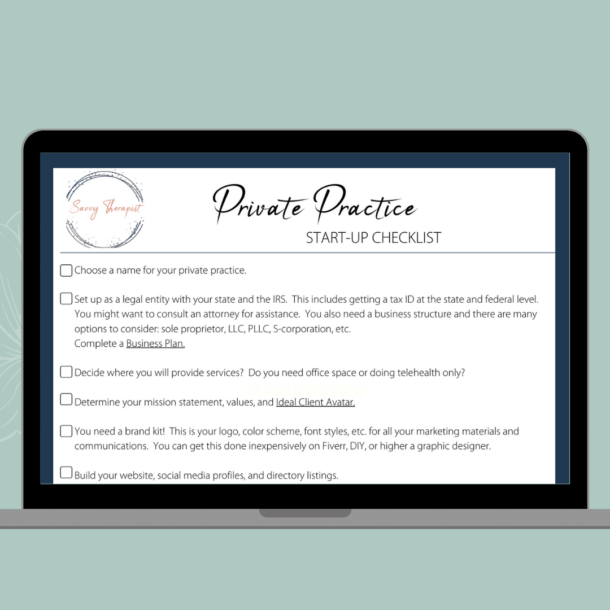Why a Tool Stack is Critical to your Private Practice Success
Having the business tools, you need to be successful in private practice is an absolute must! When I refer to a tool stack, I am talking about all those handy tools, platforms, and digital interfaces we have available to maximize our efficiency and save time.
These tools are also essential for our businesses to function. They help us as practice owners weave together a system for managing our business successfully.
Regular review of your tool stack can help you save time, increase your income, and elevate your impact as a therapist and entrepreneur.
Having the right tools in place can really change how you work and operate your private practice.
Step 1: Review your Current Tools
Let’s begin by looking at the current tools in your private practice. Make a list of every tool you are using and its purpose. This will give you a clear picture of what may be lacking or if you have tools that really aren’t serving your business.
Consider the cost of all the tools you have and make sure they are providing a good return on investment. If you have tools that you pay for that aren’t in use, reallocate those resources elsewhere!
Supporting Essential Practice Functions
Are you using the right tools to support essential practice functions? Do you leverage tools to improve your lifestyle alignment in your private practice?
There are certain tools that at this point, most private practice owners have adopted as necessary for business operations.
The first big decision related to tool stack that practice owners usually make very early on is choosing an electronic health record system (EHR) platform to store client records and deliver and document client care.
Depending on the specific tools you select, you need to address different aspects of practice management.
Universally all therapists in private practice need tools in place that help us do the following:
- Store client records securely and abide by HIPAA
- Contact and communicate with clients to coordinate services
- Process and collect payments for services rendered
- Protect our businesses and licenses from liability
- Creating a brand and practice visibility so we attract ideal clientele
- Manage the administrative functions of the practice
- Support work efficiency and the lifestyle alignment needs of the practice owner
However, there are a million ways to achieve the above outcomes and decide as practice owner which tools you use to meet those needs.
Step 2: Research Tools for your Private Practice
After you have a list of tools you currently use, start researching tools that may do the job better or add a tool that your practice is missing.
The remainder of this post is dedicated to the options and solutions you can employ to make practice management and business operations easier.
Don’t forget to revisit your tool stack regularly and make any needed adjustments.
Different Tools for Private Practice
Check out the tools listed below and see if any of them may be a fit or helpful for your private practice.
Website Tools
Yes, your private practice needs a website! If you want to establish a brand and solid reputation, clients expect a functioning website that helps them:
- Find information about your services
- Access answers to common questions
- Invites them to reach out to you or schedule an appointment
Achieving a website design that represents your brand and your practice can be a large undertaking. Depending on your level of experience or desire to be involved, you have many avenues for creating a great website.
Websites that are well designed can also help you with practice management and save on time. You can seamlessly use your website as part of your client journey.
Clients who can update their billing or insurance information, request or schedule appointments, and get answers to questions from your website generally report higher levels of satisfaction than those who provide fewer resources.
Below are a few ideas for getting a website created or improving the one you currently have for your private practice. I’ve included some options for different budgets and levels of involvement.
Budget Options
Wix allows you to create a free drag/drop website and gets high reviews for user-friendly interface. However, there are limits to third party integrations.
Additionally, advanced functionality and coding possible on other platforms is limited with Wix. But, when you are on a budget or only need something basic for your budding private practice, this might be a good fit.
Done for You
Website Services
Brighter Vision offers a variety of website packages for therapists who need help building a functional website. They do a good job of creating professional websites that function well for many practice owners.
I haven’t personally used their service, but I have coached therapists who have. Everyone I’ve spoken to seems to be satisfied. The only con is the ongoing cost of the website package. Other options are much more inexpensive annually and offer a similar aesthetic and functionality.
WordPress Developer + Web Hosting
You can always hire a professional web designer if your budget permits. This is typically the costliest way to build a website. This is likely to be a good option if you are offering services beyond therapy such as products, books, courses, or memberships and need a customized solution.
Check out UpWork or Fiverr Professional to research web designers and get an idea of cost before committing to the project.
It is also an option many practice owners take if they rebrand or once they grow to a point, they want to reinvest in their practice marketing.
Done with You
If you are looking for something in between DIY and hiring out the full project, consider outsourcing pieces of it. Counselingwise is a great resource for this! I personally used them when I started my practice to get the copy written and SEO done for my new therapy website. It was such a timesaver!
I simply recommend them because I had a great experience myself.
Do it Yourself
Hosted WordPress
This option is best if you have dreams of becoming a large group practice or want to offer products and courses outside traditional therapy.
WordPress sites are endlessly customizable, but there are themes that are easier to use than others. I personally use the Divi theme and it comes highly recommended by WordPress users.
If you have skills in web development or the time to learn the basics, having a WordPress website is totally doable and a very affordable option. It allows for the largest amount of flexibility and creativity.
To get started, you need a hosting plan for your domain. I use Bluehost, and they are wonderful and easy to use.
Social Media and Marketing Tools
If you decide to have a social media presence for your private practice, you can take advantage of some services that make generating content easier.
My favorite is Social Genie by Brighter Vision. You have access to premade social media campaigns and blogs you can post to your website.
Content can be customized to fit your practice, but you don’t need to start from scratch! This saves a ton of time and helps keep creativity flowing.
I’m terrible at remembering to post regularly. If you are short on time like I am, you can schedule social posts easily through Social Genie. Alternatively, you can also set aside an hour each month to pre-schedule your content using a social media tool like Tailwind or Buffer.
Getting your private practice out there in the universe might also include you listing yourself in directories online. A few of my personal favorites are Psychology Today, Mental Health Match, and Open Path Collective.
Just make sure you regularly monitor the activity on your online directories and choose platforms that perform well. You want to easily be able to say your investment in the platform was made back in client revenue!
Financial Tools
All private practices also have finances to manage. Having a platform for bookkeeping like Quickbooks or my personal favorite Wave Apps to keep transactions and receipts organized helps keep me on track for tax time.
I also like Novo for business banking without fees. They also incorporate financial literacy and profit first philosophy which really helps me continue to improve my financial savviness as a therapist entrepreneur.
If you need a single point payment processor, Ivy Pay is amazing and caters specifically to therapists.
EHR Tools
There is no shortage of electronic health record platforms (EHR) available on the market. Some of the top competitors are Simple Practice, Therapy Notes, Therapy Appointment, or Jane.
I currently use Simple Practice and I am a happy customer. No EHR is perfect, but Simple Practice meets most of my needs. I enjoy being able to create all my forms and store and send them electronically.
The one platform covers all needs including billing and managing insurance claims.
There are always improvements being made to the platform. I’ve been a customer for over 4 years and in that time, so much has been improved upon based on customer suggestions.
If you want to try it out and get $100 towards the cost of your plan, check it out.
Billing
If your EHR doesn’t have the capability for billing or you want to house billing outside your EHR, you might consider hiring a biller.
Billers can be incredibly helpful if you bill insurance and feel overwhelmed by the work and details involved. Currently, I work with Breezy Billing and love their top-notch customer support.
General Tools
You likely need a phone service or business phone number for clients to reach you. You can get a number through Google Voice or Grasshopper. I prefer Grasshopper because it is easier to have everything on my phone and I don’t need a complex solution.
Need a platform to organize everything you don’t keep in your EHR? Consider a platform like Trello to organize and plan for the future of your therapy practice.
The options for organizing and optimizing workflows on Trello are endless. Just be sure not to house any confidential data relating to client services.
You will also find that designing graphics, making flyers, or updating your business card is a lot easier if you have a reliable and FREE platform to design graphics like Canva.
In need of an encrypted email service? Try out Hushmail.
Wrap-up
To summarize, there are a multitude of tools and tech that therapists can use to elevate their private practice experience and deliver top-notch services.
I encourage you to check out your tool stack, review it often, and make updates when solutions no longer suit your business.
If you need more help building your tool stack, schedule a Business Strategy Session and get the clarity you need to simplify day to day operations in your private practice.
**Disclaimer: Some of the weblinks included in this post are affiliate links. I only recommend products I like and believe in and remain transparent about products or services I promote.



Recent Comments